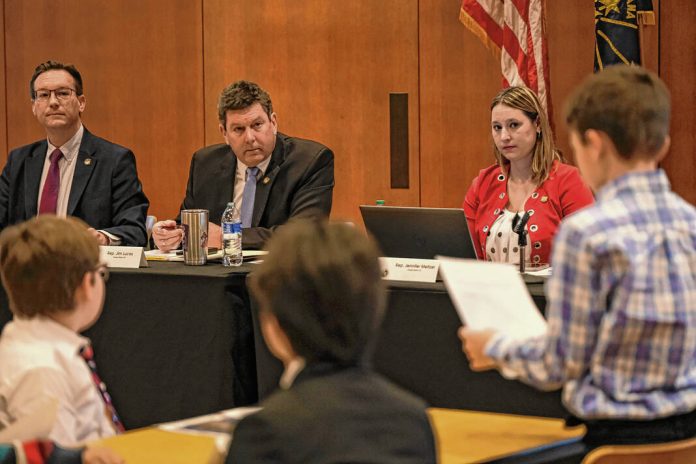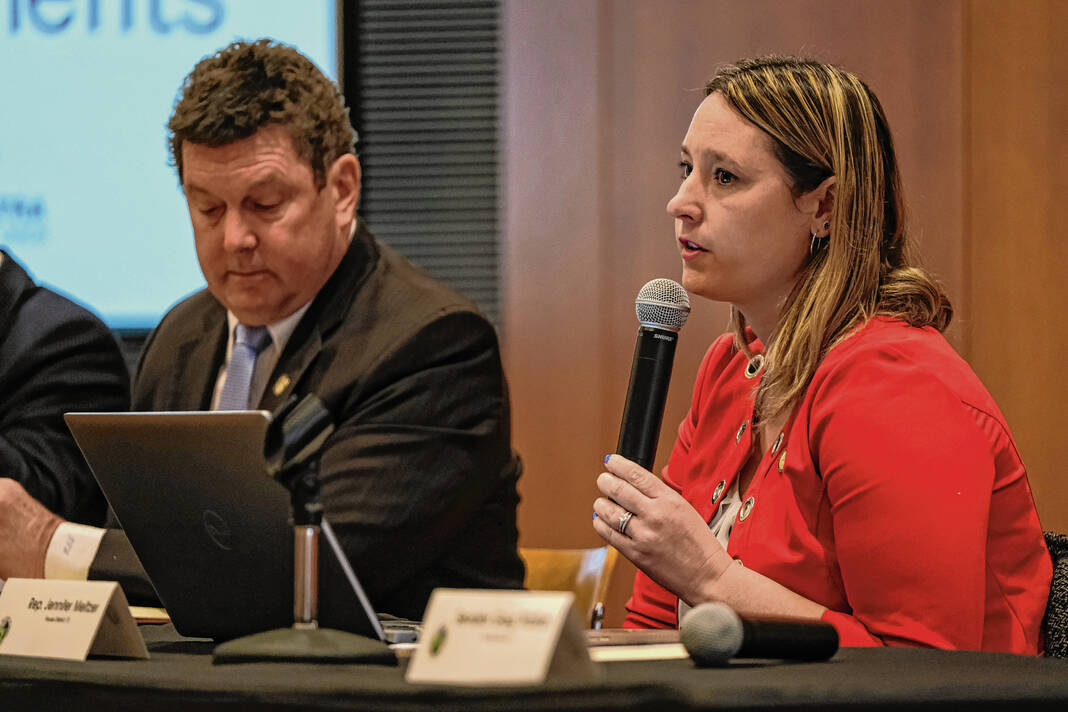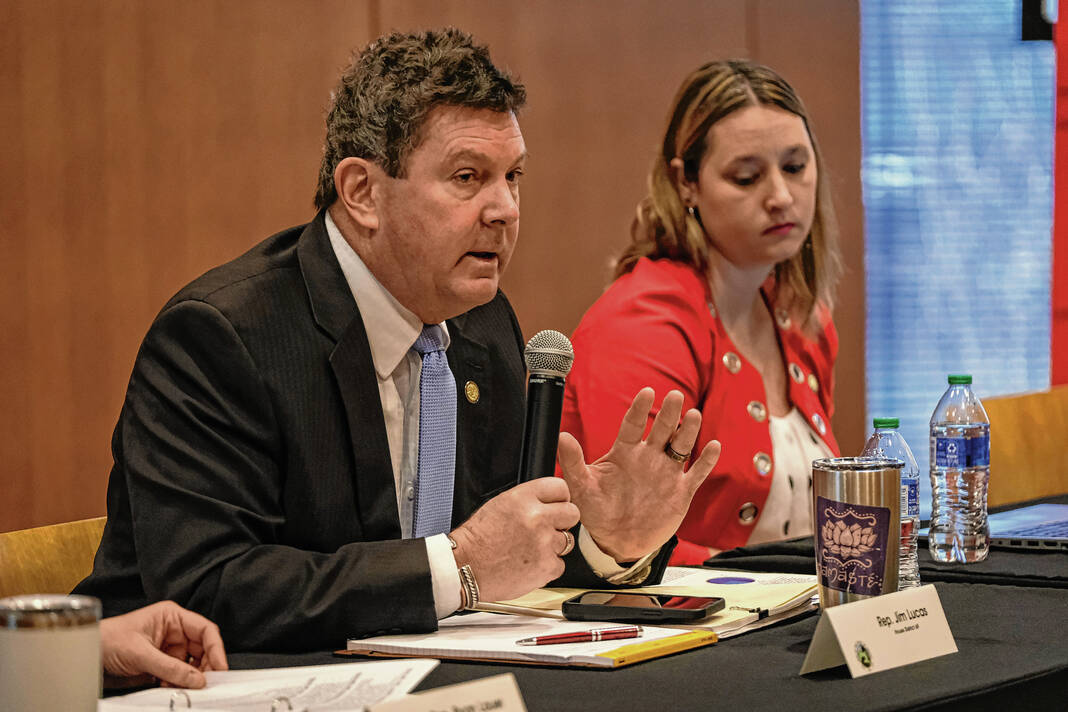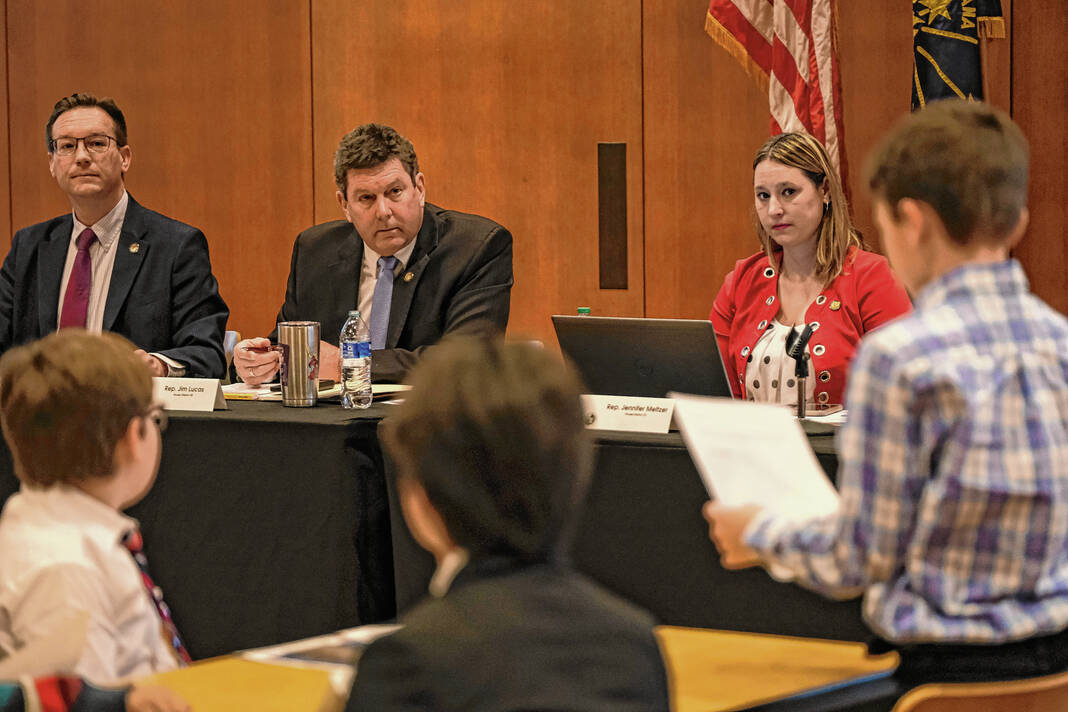
Mike Wolanin | The Republic State Reps. Ryan Lauer, from left, Jim Lucas and Jennifer Meltzer take questions from students from ABC Stewart School during a panel discussion at Columbus City Hall in Columbus, Ind., Monday, Feb. 5, 2024. The legislators discussed bills on the agenda during the current legislative session.
The Bartholomew County area’s Republican legislative delegation is divided over a top-priority bill that would result in more third-graders being held back a year if they fail a standardized reading exam.
Senate Bill 1 would require schools to retain third-graders who fail the IREAD test, with a few exceptions. The bill passed the Senate last week on a 36-13 vote, though Sen. Greg Walker, R-Columbus, was one of four Republican senators to vote against it.
At the Legislative Mid-Session event before about 60 people Monday at Columbus City Hall hosted by the Columbus Area Chamber of Commerce, House members representing the area — Republican Reps. Ryan Lauer of Columbus, Jim Lucas of Seymour and Jennifer Meltzer of Shelbyville — signaled support for the bill. Walker did not attend.
Retired Bartholomew Consolidated School Corp. teacher Sandy Watts told lawmakers she believes holding back more third-grade students might do more harm than good.
Watts said 40% of students who are retained once drop out of school, but the dropout rate rises to nearly 100% if students are held back twice. She noted initiatives to help students gain reading proficiency locally such as Prime Time, Book Buddies and tutoring, “and that makes a difference.” She shared a personal experience of helping a child who entered third grade unable to read, but who learned and nearly caught up to grade level in one year with specialized attention.
“We got him to beginning third grade (reading level), but when he took IREAD, he wasn’t ending third grade (reading level), so he failed. If you require that he go to summer school and be tested again, can you imagine the trauma? He had felt successful, because he had improved,” Watts told the lawmakers. “Can you imagine, one test deciding if you are retained a whole year? And you are not with your friends … and fingers are pointed. So I want to know how you’d address it.”
Lucas replied, “Reading is so vitally important not just to children but to adults as they grow older. Learn to read, read to learn. If you can’t read, you are severely limited throughout your life in what you can and cannot accomplish.” He said the state has spent millions more on education in recent years yet IREAD test scores have declined.
“What we’re doing now isn’t working. … What I would love to see happen is to empower schools such as ABC,” he said, in a nod to visiting students from ABC Stewart Montessori School. “You guys do your own thing. What do you think? You’re the teachers. Let teachers teach. Let them create solutions. … Today’s technology and social media, somebody creates something that is working, replicate that. We don’t have to keep thinking we have to reinvent the wheel. Let’s find out what works, share that, and get everybody on the same sheet of paper.”
Meltzer, a mother of three young students, said, “As a parent, I’d be curious as to how a child makes it to third grade without being able to read.
“… Every single child is different, but there are so many resources for (individualized education plans). There are so many different points of intervention that (if) the child walks into third grade not being able to read, I want to know why. And there’s a multitude of different reasons. There could be dyslexia, there could be so many issues going on at home that this is the last thing this child needs to be worrying about. But if that’s the case, there’s other safety nets that hopefully catch that kid.
“I agree with Rep. Lucas, throwing money at this problem has not worked,” she said. “… I fully respect that holding a child back is extremely detrimental. I also wonder if we just continue to pass them, if we don’t catch them, are we going to send them to sixth, seventh, eighth grade not able to read?
“I also fully agree that the child who went from not reading to a third-grade level in one year, that is extremely impressive. Good job. … I want to empower schools, I believe in local control, I believe that goes all the way down to the classroom level. Teachers are trained to teach, we should let them teach. I think it’s a complicated issue and it’s going to be one we that we continue to look at.”
Lauer referred back to last year’s “science of reading” legislation and said, “We’re still waiting to see those (principles) fully implemented across the state.”
“… The kids in third grade that are not at reading level, in the past, go back 10 years, a number of these students would be held back to have another year and get their reading up, right? We’ve seen in more recent years, though, that almost every one, 97%, gets moved to the next grade. And there’s a disconnect there.
“… I think it’s doing the kids a disservice if we just keep pushing them along,” he said.
He also noted that Senate Bill 1 includes extra tutoring, summer school, and different options to help teachers get students to reading at grade level. “But I think the reality is, is that in some cases, these are exceptions … we just want to make sure that that is appropriate at some point to hold kids back, to make sure they are progressing and that they can read. It’s so important.”
Child safety, care bills
Lauer discussed a couple of bills he authored that have passed the House and await action in the Senate that he said would improve conditions for vulnerable children and “getting them adopted quicker.” Both bills cleared the House with unanimous bipartisan support.
“We heard testimony of families, foster families, taking years to adopt their kid,” Lauer said. “And we want to really shorten that, make it quicker and easier.”
Toward those ends, House Bill 1101 would establish safe baby courts as a problem-solving court that could have special jurisdiction in cases involving children age 3 and younger who are victims in allegedly abusive or neglectful circumstances.
Also, House Bill 1310 focuses on getting children who are in foster care to permanency faster while also adding protections for foster families to guard against retaliation.
Separately, lawmakers were asked what they think the state can do to address a statewide shortage in affordable child care. Several bills this session sought to reduce regulations and/or provide incentives for child care service providers. Senate Bill 2, which includes many reforms, passed with strong bipartisan support. House Bill 1102, which would exempt some providers from licensing, has been more controversial but passed on a 75-21 vote.
“Obviously we want to make sure that we’re continuing to protect children but we also need to make sure that we’re not preventing individuals from opening up a small business being able to care for kids,” Meltzer said.
“As a mom of three children, I fully understand how difficult it is to find child care, and to understand you want to be able to trust the person that you’re dropping your child off to. I am spoiled rotten — my mother-in-law watches my children and has since they were 6 weeks old.”
For people who don’t have such options, Meltzer said it’s important they have the confidence of knowing the care provider to whom they entrust their children has been vetted and will provide a safe environment.
Other issues
Lawmakers also:
- Touted House Bill 1001, which would create grants of up to $5,000 per student for workplace, career, apprenticeship or secondary education training, among other measures. The bill passed the House last month 80-17 and awaits action in the Senate.
- Discussed a bill limiting the use of artificial intelligence in political advertising. House Bill 1133 passed the House with unanimous bipartisan support. That bill cleared the House with unanimous bipartisan support.
- Voiced support for affordable housing measures and efforts to reduce homelessness, though few bills addressing those issues have moved at the Statehouse.












